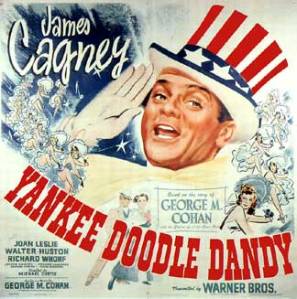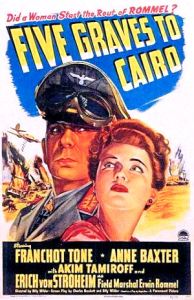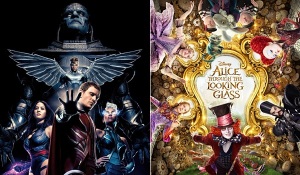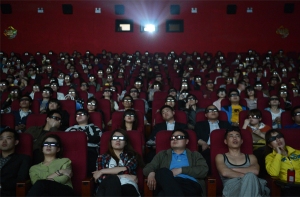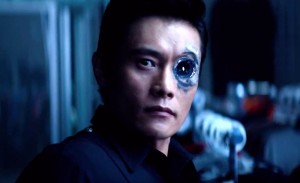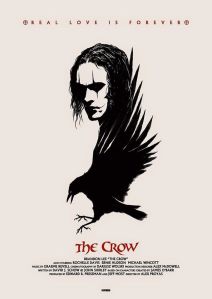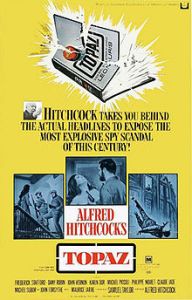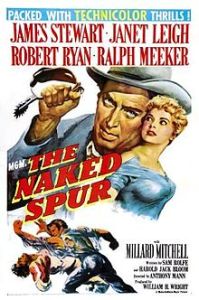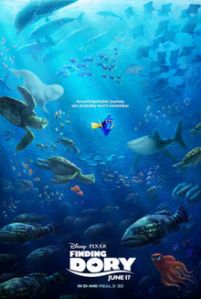
The main reason I found "Finding Nemo" to be so enduring is due to the simple story of a character on a journey to save his son and the vast wondrous world that he discovers along the way, a world that he was so often afraid to go out and explore. He met a vast range of characters along the way that all stood out and all of them left an impression on us, from the sharks that wanted to make friends with fish instead of eat them, to the surfer-dude turtles, to the pelican that always had his massive nose in other people's business.
But perhaps the most memorable character from "Finding Nemo" was the forgettable blue tang Dory. For me, the only reason that character worked was because of the superb voice talent of Ellen DeGeneres, who gave us an always optimistic and hopeful character to work off of Albert Brooks' cynical and calculating Marlin. The pair worked perfectly for that film and made each other better than they would have been alone.
So it made sense that Dory would eventually get her own movie (especially with DeGeneres constantly bugging Pixar about making a sequel on her talk show), and giving us "Finding Dory." While this is a film that wasn't necessary to the story of the first film, it is a welcomed addition to the Pixar family thanks to improved visuals and touching and effective story.
Set one year after the events of "Finding Nemo," Dory (DeGeneres) suddenly has lost-lost memories about her parents and immediately sets out to go find them in California, with her friends Marlin (Brooks) and his son Nemo tagging along to help her. Along the way, they meet several new friends, including a reserved and shady octopus (Ed O'Neill), a near-sighted whale shark (Kaitlin Olson) and a beluga whale that doesn't know how to use its echolocation (Ty Burrell).
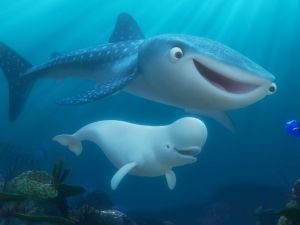
I have mixed feelings about the story of "Finding Dory." On the one hand, the story is copy-and-paste from the first film, minus the adventure of watching Marlin and Dory reach their destination. On the other hand, the film is still very clever about how Dory is able to remember all of this. Little bits of foreshadowing are thrown in throughout the film, like how Dory is able to remember that Octopus' have three hearts and Sigourney Weaver voicing the PA system for the marine habitat that Dory and crew must infiltrate.
The story is clever in what it chooses to show the audience, but somewhat lazy in feeling like a copy of "Finding Nemo."
And while the film does a small amount of memorable new characters, "Finding Dory" lacks the amount of variety the first movie had. We got to spend more time observing the many fish that inhabit the ocean floors than we did with Marlin looking for his son "Finding Nemo," and the ocean was just as much a character as anyone else in that film. But here, we get to know Ed O'Neill's grumpy octopus (though we don't really know why he's so grumpy, other than he doesn't like people), and a bit about the whale shark and the beluga whale, but they're more comic relief than anything else.
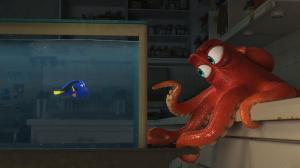
That's another aspect that is sadly missing from this film - Dory's comic relief.
Oh sure, DeGeneres still gets some good lines in there every once in a while, but because she is the focal point of this journey to find her long-lost parents, she has to constantly be on the look-out for clues and signs leading her mom and dad. This means that she doesn't get much time to be her usual funny self. We still end up getting a decent amount of comedy, but it's from other characters like Marlin and the octopus, and their cynical outlook tends to make the comedy feel a bit off.
That being said, the animation is even more breath-taking than it was in the last film. The vast range of colors on display here is incredible and even something as simple as the way the sun reflects and refracts off the ocean is taken into account. Each character stands out even more than now, and even blue fish so put brilliantly in the vastness of the ocean. Pixar truly has outdone themselves with the animation on this one.
Overall, I did enjoy "Finding Dory" even if it doesn't hold a candle to "Finding Nemo." We still get to see the beautiful part of ocean and what lurks in its terrifying depths, there are plenty of new and interesting characters, and the story is both intelligent and touching in its approach to Dory remembering her parents. At times it is simple, but other times it tries harder than it needs to. Then there are those moments where everything comes together effortlessly, like many of the scenes between Dory and the octopus, that are such a joy to watch.
Final Grade: B-

